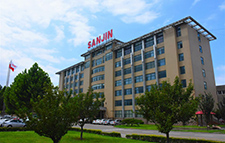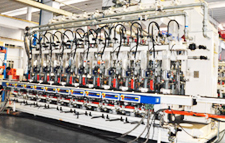For example a dust extraction and filter system in the foundry and in the welding shop have been installed. The positive results of the investments were quickly apparent – both in terms of environmental emissions and improved health and safety at work for the approximately 800 employees.
To manufacture its glass forming machines, Bucher Emhart Glass produces 2’100 different metal parts at its Sanjin plant alone – a total of 28’000 pieces per month. Production of these metal parts begins in the company's own foundry, where they are moulded. They are then further processed in the welding shop and the hardening shop. During such production steps, dust, particles and gases are usually produced.
Bucher Emhart Glass has invested in state-of-the-art extraction and filter systems that absorb and collect these particles and gases so that they do not get into the air and into the worker’s respiratory tract (picture from the foundry).
In addition, special walls protect employees from being dazzled by the glistening welding light (picture from the welding shop).
Highest possible environmental standards achieved
Finally, the metal parts are given a coating. Later they have to withstand extremely strong strains during glass production. As early as 2013, Bucher Emhart Glass had also relied on innovative technologies and top quality for its paint shop in order to reduce emissions and the volume of waste water. A modern rotating system catches the atomised spray and returns 98% of its paint components to the spraying process (picture from the paint shop above).
An in-house sewage treatment plant purifies the waste water produced during the painting process. All systems, from the foundry to the paint shop, comply with the latest international environmental standards, and Bucher Emhart Glass thus meets the highest possible level that a manufacturing plant in China can achieve. Only the "primary standard", which is equivalent to emission-free operation under Chinese law, remains above this level.
Sustainable production increases satisfaction and quality
The positive results of the investments were quickly apparent – both in terms of environmental emissions and improved health and safety at work for the approximately 800 employees. An in-house survey showed an 8% increase in their satisfaction and motivation.
A good working environment and high safety standards also increase productivity and quality and help to recruit qualified specialists. This in turn improves product quality.
Written in November 2019, as part of a campaign by Economiesuisse, Swiss Business Federation




